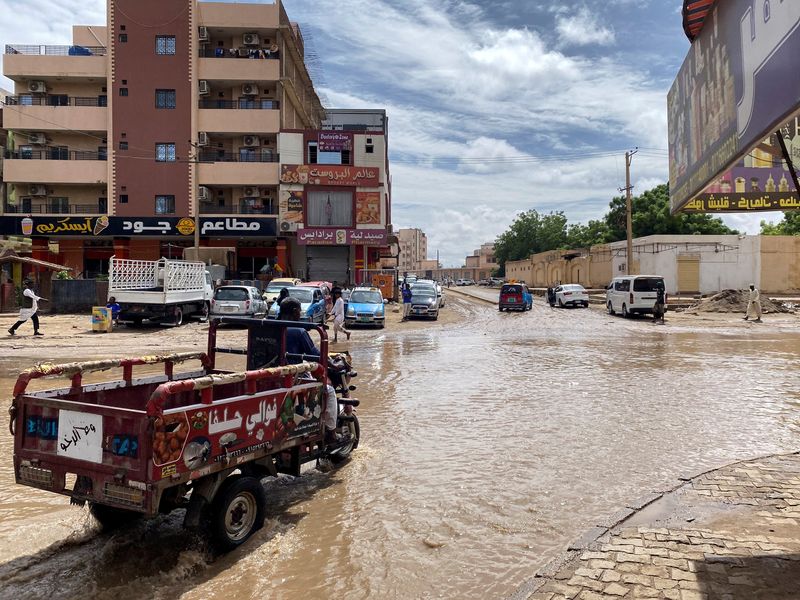CAIRO (Reuters) -Thousands of people are stranded on the streets of the eastern Sudanese city of Kassala as a deluge of rain compounds the suffering of more than a million Sudanese who sought refuge in the region from a 15-month-old war.
The rainy season that began earlier this month has already damaged shelters, made roads unusable, and will put millions at risk of water-borne diseases across large areas of the country.
It comes as the number of displaced people within Sudan, currently more than 10 million, continues to tick up as the paramilitary Rapid Support Forces (RSF) expands its territory in the war with the national army.
The war erupted in April 2023 and has sparked warnings of famine and what the United Nations has labelled the world's largest humanitarian crisis.
Some 765,000 people are sheltering in Gedaref state, and more than 255,000 people are in Kassala state, which saw the worst of the rains over the weekend, according to the United Nations.
The most recent wave of 165,000 people is from Sennar state, many arriving on foot in the rain in recent weeks. More than 10,000 who arrived in Kassala city were packed in the few remaining empty buildings, including a school courtyard and an empty hangar, which quickly flooded with water.
"We endured the sun beating down on us, but we can't handle the rain," said Nada Omer.
They now wait under store awnings or tarps in the street, with heavier than usual rains expected to continue until September. Some have rejected a plan to move them outside the city, a government official and aid workers said, where there would be few income opportunities.
"We are waiting in the street and have nowhere to settle," said Hussein Abdo, another displaced person.
UNHCR, the UN's refugee agency, is working on identifying more suitable sites, a spokesperson said, but its work is only one-third funded.
At least five people have reportedly been killed because of the rains, according to the United Nations.
Those who arrived earlier from Khartoum or El Gezira state, or in slightly drier al-Gedaref, are not much better off, sleeping on the floor in schools with few services and makeshift, shallow toilets that have also been flooded.
Little was done to prepare for the situation, said Plan International's Mohammed Qazilbash. "We are coming up to 500 days of the war, and everybody is exhausted... It's one tragedy over another over another," he told Reuters.
The government and aid workers are bracing for the expected rise in water-borne diseases, including cholera, malaria, and dengue fever, with few medicines to treat them.
"We are sharing what is available, but it is above our capacity" said Dr Ali Adam, head of the state health ministry.
The rainy season impacts most of the country. Last week, more than 1,000 houses and 800 latrines were destroyed by rain at Zamzam camp in North Darfur, one of the locations in the country where experts say famine is likely.
Meanwhile, the RSF's advance has not stopped, and on Monday it said it had reached an area about 180km (112 miles) from Gedaref, one of the states that has sheltered the most people.

Kassala, the only neighbouring army-controlled state, does not have capacity to absorb people from Gedaref, nor does the army's de facto capital Port Sudan, on the Red Sea.
"People are scared, but there's no options," said a volunteer in the Gedaref emergency response room. "They are awaiting their fate, the other cities are full."